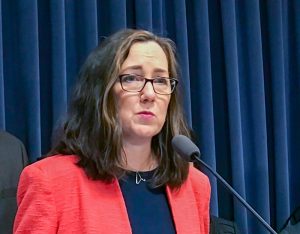Legalized ‘human composting’ proposed as greener alternative to burial
By Andrew Adams Capitol News Illinois — March 9, 2023
State Rep. Kelly Cassidy, D-Chicago, is pictured in a file photo. (Capitol News Illinois file photo)
CHICAGO – Religious and environmental ideals are at odds for some in the ongoing debate around what to do with human remains.
A proposal at the Illinois Statehouse would legalize and regulate “natural organic reduction,” a process in which human remains are rapidly decomposed into compost. The process is also known as human composting or terramation.
That process turns human remains into dirt over the course of several weeks. Companies that offer this service place a person’s remains in a vessel with wood chips, straw and other organic material and heat it to accelerate the growth of microbes that break down the body. This is distinct from “natural burial,” in which a body is buried with no casket or in a biodegradable container.
The measure, House Bill 3158, passed in the House Energy and Environment Committee on Tuesday on a 16-10 vote. It now goes to the House for consideration, although its sponsor, Rep. Kelly Cassidy, D-Chicago, said an amendment to the bill is likely.
If lawmakers approve the proposal, Illinois would become the seventh state to legalize this process. Washington, Colorado, Oregon, Vermont, California and New York have already made the process legal, according to the human composting company Recompose.
Recompose pushed for the legalization of human composting in Washington. Its website notes that a body will stay in the vessel for four to seven weeks before the resulting soil is allowed to cure for two to six weeks. A person’s loved ones are then left with approximately one cubic yard of soil.
“Natural organic reduction is, in fact, the most environmentally friendly death care option,” Haley Morris, a representative of the human composting company Earth Funerals, said during the committee hearing.
“It’s less resource intensive than any other option and it reduces carbon dioxide emissions by nearly 90 percent relative to traditional options,” Moris added
Representatives of several environmental groups around the state have also voiced their support of the bill in witness slips filed with the committee. These include the Illinois Environmental Council, the Illinois Chapter of the Sierra Club and Go Green Winnetka.
Cassidy filed an amendment on Wednesday altering some of the fee structures for licensing the practice and indicated in an interview that another forthcoming amendment will modify some of the regulations around testing the compost.
“This is about creating choices and options and in particular choices that are less harmful for the planet,” Cassidy said.
Cassidy also said she updated her own will last year to include that she would like her body to undergo the natural organic reduction process.
Notable among the bill’s opponents is the Catholic Church. Daniel Welter, the recently retired chancellor of the Archdiocese of Chicago, spoke to lawmakers at the request of the Catholic Conference of Illinois on Tuesday.
“Turning the mortal remains of a human person into compost for the purpose of fertilization, as one would with vegetable trimmings or eggshells, degrades the human person and dishonors the life that was lived by that person,” he said during the committee hearing.
Welter added that he and the church “oppose any tendency to minimize the dignity of a human being, even after death.”
Representatives of the death care industry also oppose legalizing this process. LeNette Van Haverbeke, a representative of Illinois Cemetery and Funeral Home Association, told lawmakers that many in the field “oppose human composting as lacking the traditional dignity afforded to the dead.”
Others in the field are not as critical. After a similar bill was met with opposition last year from the Illinois Funeral Directors Association, Cassidy met with representatives of the industry to craft new language regulating the vessels used in the process, professional licensing and soil testing among other elements of the bill.
“I’m not saying we’re a proponent of it, but the sponsor did listen to us,” said Margaret Vaughn of the Illinois Funeral Directors Association.







